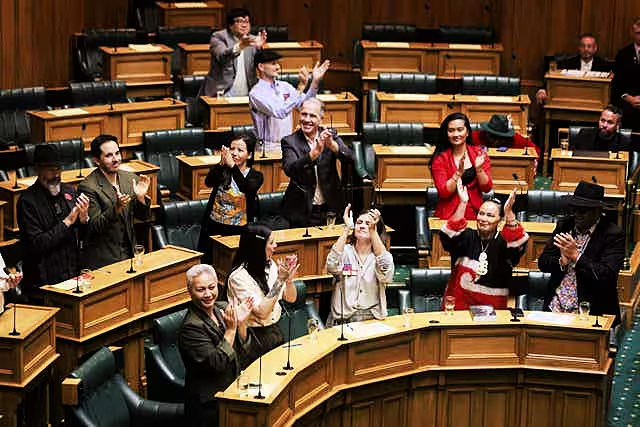
New Zealand lawmakers have dealt a crushing defeat to a challenged bill that would have redefined the country’s founding treaty between Maori tribes and the British Crown.
The Treaty of Waitangi Principles Bill was defeated in parliament in Wellington on Thursday by 112 votes to 11, stopping it from going forward to a third and final vote.
After the results were announced, legislators began to applaud and cheer, and the audience sang a waiata, a traditional Maori song.
No one expected that a radical reinterpretation of the 1840 treaty signed by British representatives and 500 Maori chiefs during the colonisation of New Zealand would become law.
However, the measures have sparked a heated debate about the rights of indigenous peoples and last November sparked the largest race relations protests in the country’s history.
However, his defeat did not end the scrutiny of Maori rights in New Zealand law.
– What is the Treaty of Waitangi?
The Treaty defines the relationship between the government and Māori, and its meaning has been shaped by decades of legislation and court decisions.
The tribes were promised extensive rights to retain their lands and protect their interests in exchange for handing over control to the British.
However, two versions of the document were signed – one in English and one in Maori – and although both guaranteed the Maori the rights and privileges of British citizens, they differed in the powers that were conferred on the chiefs.
Crown abuses have resulted in significant disenfranchisement of Maori, who continue to face serious inequalities.
Since the start of the Indigenous protest movement in the 1970s, the provisions of the Treaty have become increasingly prominent in New Zealand law.

Efforts to restore the damage have helped revive the disappearing Maori language and culture, which are now being restored, and led to billions of dollars in payments for lands taken from Maori.
– What does the bill say about the principles of the treaty?
The bill sought to end a 185-year dispute over the meaning of the Treaty by establishing specific definitions for each clause in law and making it clear that any rights must apply to all New Zealanders.
Its sponsor, libertarian legislator David Seymour, who is Maori, denounced what he called special rights and privileges based on race.
In his speech to the legislature
Sourse: breakingnews.ie